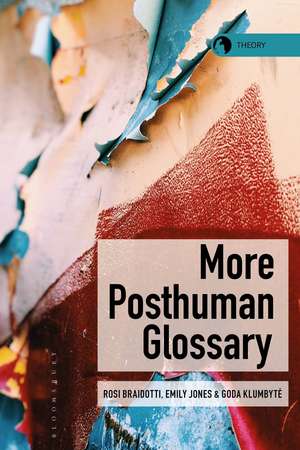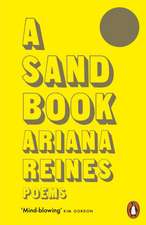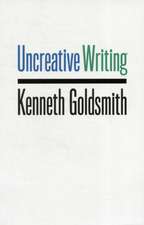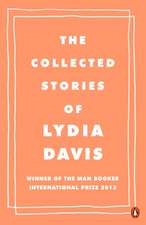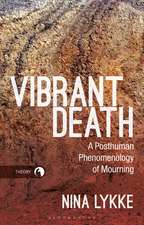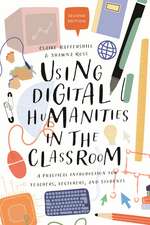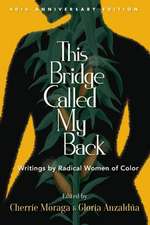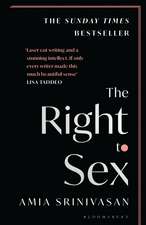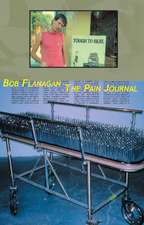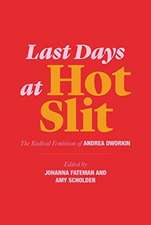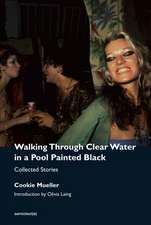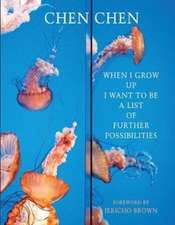More Posthuman Glossary: Theory in the New Humanities
Editat de Professor Rosi Braidotti, Emily Jones, Goda Klumbyteen Limba Engleză Paperback – 30 noi 2022
| Toate formatele și edițiile | Preț | Express |
|---|---|---|
| Paperback (1) | 147.57 lei 3-5 săpt. | +27.75 lei 6-12 zile |
| Bloomsbury Publishing – 30 noi 2022 | 147.57 lei 3-5 săpt. | +27.75 lei 6-12 zile |
| Hardback (1) | 406.99 lei 6-8 săpt. | |
| Bloomsbury Publishing – 30 noi 2022 | 406.99 lei 6-8 săpt. |
Preț: 147.57 lei
Preț vechi: 159.67 lei
-8% Nou
Puncte Express: 221
Preț estimativ în valută:
28.24€ • 29.69$ • 23.33£
28.24€ • 29.69$ • 23.33£
Carte disponibilă
Livrare economică 27 martie-10 aprilie
Livrare express 12-18 martie pentru 37.74 lei
Preluare comenzi: 021 569.72.76
Specificații
ISBN-13: 9781350231436
ISBN-10: 1350231436
Pagini: 224
Dimensiuni: 156 x 234 x 18 mm
Greutate: 0.38 kg
Editura: Bloomsbury Publishing
Colecția Bloomsbury Academic
Seria Theory in the New Humanities
Locul publicării:London, United Kingdom
ISBN-10: 1350231436
Pagini: 224
Dimensiuni: 156 x 234 x 18 mm
Greutate: 0.38 kg
Editura: Bloomsbury Publishing
Colecția Bloomsbury Academic
Seria Theory in the New Humanities
Locul publicării:London, United Kingdom
Caracteristici
This volume looks to the future, as authors imagine and predict what new terms might come into being as this exciting field continues to expand
Notă biografică
Rosi Braidotti is Distinguished University Professor at Utrecht University, the Netherlands. Her publications include Patterns of Dissonance (1991), Metamorphoses (2002), Transpositions (2006), Nomadic Subjects (1994 and 2011), Nomadic Theory (2011), The Posthuman (2013), and Posthuman Knowledge (2019). She co-edited with Paul Gilroy Conflicting Humanities (2016) and with Maria Hlavajova The Posthuman Glossary (2018).Emily Jones is Lecturer in Law at the University of Essex, UK. She is author (with G. Heathcote; S.Labenski and S.Bertotti) of The Law of War and Peace Volume 1 (2020) and Volume 2 (forthcoming 2023, Bloomsbury).Goda Klumbyte is a Research Associate at the University of Kassel, Germany. Her research engages feminist science and technology studies and critical computing.
Cuprins
Contributors Preface, Donna HarawayIntroduction, Rosi Braidotti, Emily Jones and Goda Klumbyte GlossaryActing as country, Daryle RigneyAgrarian (Post-)Humanities, Sophie von RedeckerAlgoritmic governmentality, Antoinette Rouvroy and Goda KlumbyteArt and Bioethics, Sarah BoersCollaborative Politics, Simone BignallCollapse, Christopher F. JulienComposting, Astrida Neimanis and Jennifer Mae HamiltonConvergences, Rosi Braidotti, Emily Jones and Goda KlumbyteCosmic Artisan, Kay SidebottomCrip Theory, Kelly FritschCritical Posthuman Theory, Rosi Braidotti and Emily Jones (De)constructing Risk, Helene KazanDefamiliarisation, Helen PalmerDissappearance, Rick Dolphijn and Trixie TsangThe Distributed University, Sarah Nuttall and Rosi Braidotti EcoLaw, Margaret DaviesEmergent Ecologies, Eben KirkseyEmpathy Beyond the Human, Danielle SandsEndomaterialities, Celia RobertsExistential Posthumanism: A Manifesto, Francesca FerrandoEx-colonialism, Simone BignallFeminism and oceans, Gina HeathcoteFermentation, Olga GoriunovaGeoengineering, Holly Jean BuckGeontopower, Elizabeth PovinelliHumus Economicus, Janna HolmstedtHydrofeminism, Astrida NeimanisInternet of Trees, Jennifer GabrysIntragenerational Justice and Care, Christina FredengrenLinguistic Incompossibility, Ruth ClemensLow Trophic Theory, Cecilia Åsberg and Marietta RadomskaManus Island and Manus Prison Theory, Omid Tofighian with Behrouz Boochani The Meltionary,Melt (Loren Britton and Isabel Paehr)Nauru Imprisoned Exiles Collective, Elahe Zivardar, also known as Ellie Shakiba (with Mehran Ghadiri)New Materialist Informatics, Goda Klumbyte and Claude DraudeNorms, Fleur JohnsOntologised Plasticity, Zakkiyah Iman JacksonOrganoids: arts, ethics, technology, Sarah BoersParasitology, Rick DolphijnPattern Discrimination, Clemens ApprichPetroculture, Josephine TaylorPostcolonial and decolonial computing, Paula Chakravartty and Mara MillsPostcolonial Drone Scholarship, Sabiha AllouchePosthuman Agency, Simone BignallPosthuman Care, Rosi Braidotti and Goda KlumbytePosthuman Data, Jannice KällPosthuman Feminist Aesthetics, Nina LykkePosthuman International Law and Outer Space, Emily Jones and Rosi BraidottiPost-humanitarian law, Matilda Arvidsson Posthuman Nursing, Jamie B. SmithPosthuman Publics, Fiona HillaryPosthumanism and Design, Laura ForlanoProxy Reasoning, Olga GoriunovaQueer Death Studies, Marietta Radomska and Nina LykkeRacialising Assemblages, Ezekiel Dixon-RománRelational Sovereignty, Simone BignallRights of Nature, Emily JonesSide-channel Attack, Matthew FullerSurface Orientations, Nishat AwanSurrogacy, Sophie LewisSwarm warfare, Lauren WilcoxSyndemic, Joni Adamson and Steven HartmanToxic Embodiment, Cecilia ÅsbergTranscorporiality II: Covid-19 and Climate Change, Stacy AlaimoTransjectivity, Christine DaigleUndead, Julieta Aranda and Eben KirkseyVibrant Death, Nina LykkeViral, Filipa RamosWeird, Gry UlsteinCumulative Bibliography
Recenzii
More Posthuman Glossary provides a significant set of framework concepts and topics that navigate through the abundance of innovative methodological tools generated by posthumanist practices, and enables ways to think with the complex conditions of the world.
How are we to navigate the world today? The editors of More Posthuman Glossary adopt the Stengerian strategy of forming relays. The question is no longer whether to render explicit or clarify what would remain implicit. It is about "consolidating just a little more", always a little more with every new entry in the glossary. Encore!
How are we to navigate the world today? The editors of More Posthuman Glossary adopt the Stengerian strategy of forming relays. The question is no longer whether to render explicit or clarify what would remain implicit. It is about "consolidating just a little more", always a little more with every new entry in the glossary. Encore!
